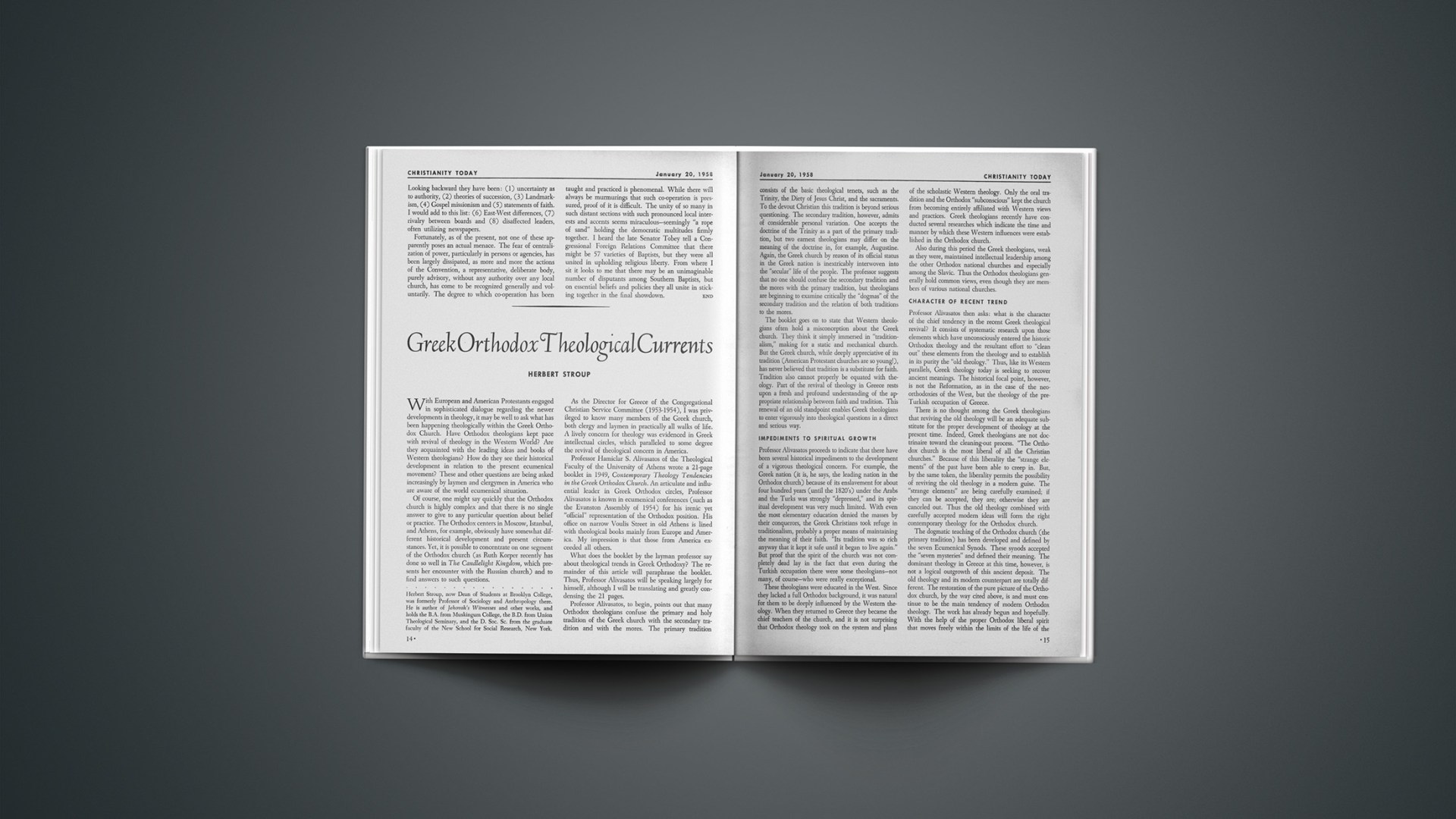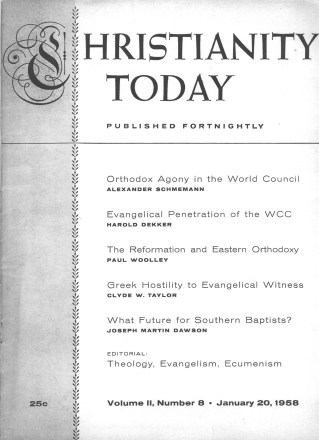With European and American Protestants engaged in sophisticated dialogue regarding the newer developments in theology, it may be well to ask what has been happening theologically within the Greek Orthodox Church. Have Orthodox theologians kept pace with revival of theology in the Western World? Are they acquainted with the leading ideas and books of Western theologians? How do they see their historical development in relation to the present ecumenical movement? These and other questions are being asked increasingly by laymen and clergymen in America who are aware of the world ecumenical situation.
Of course, one might say quickly that the Orthodox church is highly complex and that there is no single answer to give to any particular question about belief or practice. The Orthodox centers in Moscow, Istanbul, and Athens, for example, obviously have somewhat different historical development and present circumstances. Yet, it is possible to concentrate on one segment of the Orthodox church (as Ruth Korper recently has done so well in The Candlelight Kingdom, which presents her encounter with the Russian church) and to find answers to such questions.
As the Director for Greece of the Congregational Christian Service Committee (1953–1954), I was privileged to know many members of the Greek church, both clergy and laymen in practically all walks of life. A lively concern for theology was evidenced in Greek intellectual circles, which paralleled to some degree the revival of theological concern in America.
Professor Hamiclar S. Alivasatos of the Theological Faculty of the University of Athens wrote a 21-page booklet in 1949, Contemporary Theology Tendencies in the Greek Orthodox Church. An articulate and influential leader in Greek Orthodox circles, Professor Alivasatos is known in ecumenical conferences (such as the Evanston Assembly of 1954) for his irenic yet “official” representation of the Orthodox position. His office on narrow Voulis Street in old Athens is lined with theological books mainly from Europe and America. My impression is that those from America exceeded all others.
What does the booklet by the layman professor say about theological trends in Greek Orthodoxy? The remainder of this article will paraphrase the booklet. Thus, Professor Alivasatos will be speaking largely for himself, although I will be translating and greatly condensing the 21 pages.
Professor Alivasatos, to begin, points out that many Orthodox theologians confuse the primary and holy tradition of the Greek church with the secondary tradition and with the mores. The primary tradition consists of the basic theological tenets, such as the Trinity, the Diety of Jesus Christ, and the sacraments. To the devout Christian this tradition is beyond serious questioning. The secondary tradition, however, admits of considerable personal variation. One accepts the doctrine of the Trinity as a part of the primary tradition, but two earnest theologians may differ on the meaning of the doctrine in, for example, Augustine. Again, the Greek church by reason of its official status in the Greek nation is inextricably interwoven into the “secular” life of the people. The professor suggests that no one should confuse the secondary tradition and the mores with the primary tradition, but theologians are beginning to examine critically the “dogmas” of the secondary tradition and the relation of both traditions to the mores.
The booklet goes on to state that Western theologians often hold a misconception about the Greek church. They think it simply immersed in “traditionalism,” making for a static and mechanical church. But the Greek church, while deeply appreciative of its tradition (American Protestant churches are so young!), has never believed that tradition is a substitute for faith. Tradition also cannot properly be equated with theology. Part of the revival of theology in Greece rests upon a fresh and profound understanding of the appropriate relationship between faith and tradition. This renewal of an old standpoint enables Greek theologians to enter vigorously into theological questions in a direct and serious way.
Impediments To Spiritual Growth
Professor Alivasatos proceeds to indicate that there have been several historical impediments to the development of a vigorous theological concern. For example, the Greek nation (it is, he says, the leading nation in the Orthodox church) because of its enslavement for about four hundred years (until the 1820’s) under the Arabs and the Turks was strongly “depressed,” and its spiritual development was very much limited. With even the most elementary education denied the masses by their conquerors, the Greek Christians took refuge in traditionalism, probably a proper means of maintaining the meaning of their faith. “Its tradition was so rich anyway that it kept it safe until it began to live again.” But proof that the spirit of the church was not completely dead lay in the fact that even during the Turkish occupation there were some theologians—not many, of course—who were really exceptional.
These theologians were educated in the West. Since they lacked a full Orthodox background, it was natural for them to be deeply influenced by the Western theology. When they returned to Greece they became the chief teachers of the church, and it is not surprising that Orthodox theology took on the system and plans of the scholastic Western theology. Only the oral tradition and the Orthodox “subconscious” kept the church from becoming entirely affiliated with Western views and practices. Greek theologians recently have conducted several researches which indicate the time and manner by which these Western influences were established in the Orthodox church.
Also during this period the Greek theologians, weak as they were, maintained intellectual leadership among the other Orthodox national churches and especially among the Slavic. Thus the Orthodox theologians generally hold common views, even though they are members of various national churches.
Character Of Recent Trend
Professor Alivasatos then asks: what is the character of the chief tendency in the recent Greek theological revival? It consists of systematic research upon those elements which have unconsciously entered the historic Orthodox theology and the resultant effort to “clean out” these elements from the theology and to establish in its purity the “old theology.” Thus, like its Western parallels, Greek theology today is seeking to recover ancient meanings. The historical focal point, however, is not the Reformation, as in the case of the neo-orthodoxies of the West, but the theology of the pre-Turkish occupation of Greece.
There is no thought among the Greek theologians that reviving the old theology will be an adequate substitute for the proper development of theology at the present time. Indeed, Greek theologians are not doctrinaire toward the cleaning-out process. “The Orthodox church is the most liberal of all the Christian churches.” Because of this liberality the “strange elements” of the past have been able to creep in. But, by the same token, the liberality permits the possibility of reviving the old theology in a modern guise. The “strange elements” are being carefully examined; if they can be accepted, they are; otherwise they are canceled out. Thus the old theology combined with carefully accepted modern ideas will form the right contemporary theology for the Orthodox church.
The dogmatic teaching of the Orthodox church (the primary tradition) has been developed and defined by the seven Ecumenical Synods. These synods accepted the “seven mysteries” and defined their meaning. The dominant theology in Greece at this time, however, is not a logical outgrowth of this ancient deposit. The old theology and its modern counterpart are totally different. The restoration of the pure picture of the Orthodox church, by the way cited above, is and must continue to be the main tendency of modern Orthodox theology. The work has already begun and hopefully. With the help of the proper Orthodox liberal spirit that moves freely within the limits of the life of the Church and the Orthodox theological thought, it will succeed. The absorbing tendency of Orthodox theology in the past should enable it now to absorb consciously any new element.
Relations With The West
The present theological developments in Greece have not precluded cordial relations between the Orthodox and Western churches. Some Greek theologians may be fearful lest the Orthodox church again fall prey to heretical ideas through contact with the Western churches. But these fears must not be an obstacle to either research or “familiar” relations. “The Orthodox church is strong enough to overcome them.” The current Orthodox church not only does not exclude the idea of a vital co-operation with the Western churches; it insists upon it.
In such manner, Professor Alivasatos speaks for the theologians of the Greek Orthodox Church who are engaged in their own theological revival. True, it is a revival that is distinctively characteristic of the Greek situation. But it does have interesting parallels to what has been happening in Protestant Europe and America.
Herbert Stroup, now Dean of Students at Brooklyn College, was formerly Professor of Sociology and Anthropology there. He is author of Jehovah’s Witnesses and other works, and holds the B.A. from Muskingum College, the B.D. from Union Theological Seminary, and the D. Soc. Sc. from the graduate faculty of the New School for Social Research, New York.










